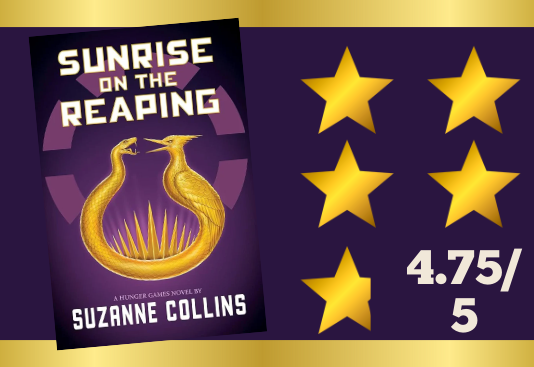
Revolution always starts somewhere. Suzanne Collins’s new book, Sunrise on the Reaping, was just released on March 18, 2025. Collins has been writing the popular book series The Hunger Games since 2008. This is the 5th book joining The Hunger Games series, preceding the original trilogy but occurring 40 years after the events of The Ballad of Songbirds and Snakes, the first prequel of the series, which was released in 2020. The story follows Haymitch Abernathy during the 50th Hunger Games, 24 years before he mentors Katniss Everdeen and Peeta Mallark. As I’m sure you gathered from the title, I loved this book. I didn’t read this with high expectations, though. While I was excited (being a long-time Hunger Games fan), I didn’t love the first prequel, The Ballad of Songbirds and Snakes, so in turn, I wasn’t expecting to love this book. I was pleasantly surprised by my enjoyment while reading.
Being a part of a series, Sunrise on the Reaping has the luxury of revolving around an already-developed world. I find that a common problem with stand-alone books is that they cannot create a setting for their characters to grow. Since the reader has already become acquainted with Panem (the fictional world in which this story takes place), extensive world-building isn’t necessary, and the story can use those pages to expand on its themes and characters rather than its setting.
One of the largest problems I had with the first prequel was the disconnect from the original story seeing as it starts 64 years before the first Hunger Games book. Because Sunrise of the Reaping took place between the first prequel and the first main book, it featured many cameos from characters from the other books and gave a new look into what they were like 24 years prior or 40 years later. It also provided a new perspective; Collins was able to differentiate the way that the narrator spoke in each of the books, and Haymitch felt distinct from the other two protagonists. There were many parallels that reminded me of reading the original trilogy, whether that be in the way the games operated, the story beats, or how the characters interacted. Because I loved the original books, getting to read something that felt like an extension of that was very exciting.
Most of the information presented in the book gave a lot of insight into other aspects of the series, and it almost felt like the missing puzzle piece. It bridged the gap between the creation of the Hunger Games and the rebellion that ended them. I don’t want to spoil anything, but the twists made so much sense in the context of everything that came before/after it.
Collins’s writing was also excellent. I went into the book knowing that I like Collins’s writing style; however, as I’ve learned before, an author’s work can change drastically between books. That was not the case for Sunrise on the Reaping. Not only was it an easy read, but the descriptions and dialogue felt realistic and appealing. Similarly, the symbolism was apparent without being too on the nose.
A large worry going in was that this book would be a cash grab, especially since a movie is already slated for next year. But the messages seemed organic to the original. The themes of revolution and tyranny felt new and revitalized rather than a rehashing of something said in 2008.
I gave Sunrise on the Reaping 4.75/5 stars. The reason it didn’t receive 5/5 was that I preferred The Hunger Games and Catching Fire, so in my opinion, they should have a higher rating than Sunrise on the Reaping. That is a very nitpicky answer, though.
This book was a fantastic addition to The Hunger Games series; the writing, setting, and characters took on new life while still staying true to the original and furthering the themes presented by Collins in every other book. It showed that Katniss was more than “the chosen one” and instead the successor of hundreds of people before her.

























